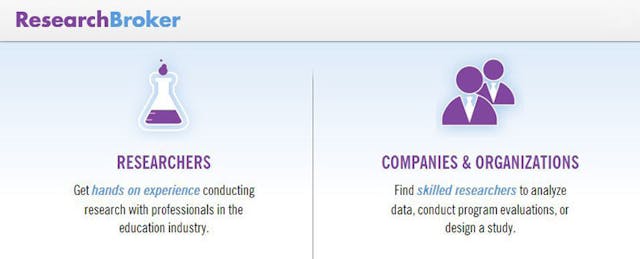Hey hotshots, does your product actually work? Wait. Before you answer that, are you even asking the proper questions and looking for the right kind of data? Janice Joo and Megha Agarwala, Innovation Fellows at EdLab at Columbia University’s Teachers College, noticed edtech developers repeatedly asking these questions at meetups and gatherings. Eventually, it was enough that they saw an opportunity to build an online platform, ResearchBroker, where the two (developers and researchers) shall meet.
“It’s a tool that decreases the barriers to accessing top-notch researchers...and fits within the curriculum of the researchers,” shared Agarwala.
Here’s how it works. Companies can post projects designed around very specific questions--or (perhaps just as likely) ask researchers for help to define them. They specify the terms of work (pay and time commitment), along with whether the researcher should have certain skills, backgrounds or experience.
Companies that have been vetted and approved (currently done by the team) can then view a list of researchers with the skill sets and experience they identified, and contact them via email. So far all of the roughly 250 researchers are affiliated with Teachers College, with diverse backgrounds in fields like psychology, curriculum design, language acquisition, and statistics.
Since its quiet launch last September, the team reports that 30 research projects have been posted, mostly by edtech startups. Shared Agarwala: “the projects involve seeking research help on evaluating/designing curriculum, running a study to evaluate learning outcomes, measuring student engagement, bringing a market researcher on the team who can study competitors and the market. We have also seen other complex projects created on the site such as seeking a researcher for discourse analysis, content analysis, and creating models for language learning.”
The platform is in its early stages, but the team already says it has five “success stories” and will invite those involved to come to EdLab and provide feedback. Equally useful, of course, is feedback on what may not have worked as well. Their sample size is small, but they eye 2013 as an important year for expanding and diversifying their reach among companies and researchers. “We’d particularly love to build partnerships with startups and incubators around the country” said Joo.
One can only playfully muse if the ResearchBroker duo will ever post a project on their own platform to help them research the effectiveness of how they've helped others with their research. (Or does that sound a little too Inception-esque?)


